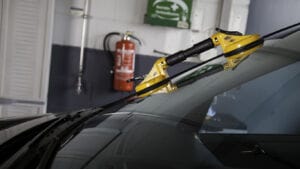We’ve all seen it at least once. You know, those vehicles that look like they belong in a salvage yard and not on the road. However, a vehicle’s appearance doesn’t always dictate whether it’s legal to drive on Alabama roads.
Understanding Alabama vehicle inspection laws is a start but it’s not the only state requirement you need to meet. To help ensure your car meets all legal requirements, here’s what all drivers should know about Alabama motor vehicle laws.
Basic State Vehicle Laws
Some state laws everyone knows like you must have a valid driver’s license to operate a motor vehicle in Alabama. Guess what. This law applies regardless of which state you call home.
If you’re wondering if you can legally drive a motor vehicle with an out-of-state license in Alabama, the answer is usually yes. As long as the license isn’t expired or has restrictions placed on it, you can drive in Alabama if your license is issued in another state.
With that being said. If your residence is in Alabama, your license must also be issued from the state. In other words, you can’t cross state lines and get a license from Mississippi if your home address is in Alabama.
You should also know that Alabama driver’s licenses expire every four years. Don’t panic, this doesn’t mean continuing to take the driver’s test. Typically, you only need to go through the testing process once, usually when you’re going from a learner’s permit to a driver’s license.
Renewing your driver’s license generally means verifying your address and possibly updating your photo. While driver’s license photos are something you rarely want to show off, who knows, maybe your next one will be a pleasant surprise.
Have Your Vehicle Inspected
Before you start worrying about going through a vehicle inspection, it helps to know what state officials are looking for. They probably don’t care about a ding in your rear bumper or a dent on a passenger-side door. The inspection rarely looks at the overall appearance of your vehicle, even if it has rust spots and mismatched paint.
You may also only need to take your vehicle in once for an inspection. Unlike some other states, Alabama doesn’t require drivers to go through an annual vehicle inspection. You typically only need to have your vehicle inspected after purchase. The inspection usually happens before your temporary license tags expire and before you get your permanent plates.
The inspection goes over the vehicle’s safety features like turn signals and seat belt systems to ensure they’re in good working order. Your vehicle’s exhaust system is also checked over to ensure your emissions are at or below state-mandated levels. If everything checks out okay, you pay a vehicle tax and you’re all set to get your permanent license plates.
A quick note. This inspection law applies to any newly purchased vehicle, even a rebuilt one from a salvage yard.
Register Your Vehicle
After going through the inspection, it’s time to register your vehicle. You only need to register the vehicle once, and yes, you also need to pay a tax. Known as a vehicle registration tax, you pay it each time you register a newly purchased vehicle. If you’re transferring a vehicle registered in another state, you’ll follow the same simple steps.
Registering a vehicle means heading down to the nearest Department of Motor Vehicles. Bring your valid driver’s license, a copy of your auto insurance coverage, and your inspection paperwork. You may also need to provide the vehicle’s title, so bring it along just in case. The state employer will verify your information, collect your registration fee, and process the paperwork.
You should receive your new Alabama license plates in the mail in a few business days. Sometimes it can take a few weeks for your plates to arrive. If your temporary tags expire keep a copy of your vehicle registration receipt. This can help you avoid a ticket for driving with expired license plate tags.
Meet Alabama Driver Insurance Requirements
Carrying auto insurance isn’t a suggestion, it’s the law in Alabama. Actually, all states and the District of Columbia require drivers to meet the minimum insurance requirements. There aren’t any exceptions regardless of the age or condition of the vehicle. If the vehicle is going out on the road it must be insured.
So, what are the auto insurance requirements in Alabama? All drivers must carry at least liability insurance. This type of insurance only covers damage to the other driver’s vehicle and medical expenses. Liability insurance doesn’t pick up the tab for your damages. You need full-coverage auto insurance to take care of your damages.
Alabama’s minimum insurance requirements are:
- $25,000 for bodily injury or death liability for one person in an accident
- $50,000 for all injuries or deaths in an accident
- $25,000 for property damage in an accident
If you decide to skip carrying auto insurance, you may be looking at more than a traffic ticket. Fines can range from $500 to $1,000 for driving without insurance. You may also lose your driving privileges for anywhere from 45 days to six months.
Repeat offenders may be required to pay for an SR-22 certificate. This shows you have insurance and the certificate isn’t cheap. You may also be facing a $400 license reinstatement fee. This fee is on top of your fine.
Not all vehicles are required to carry the state’s minimum insurance requirements. Business and government vehicles are often covered by commercial insurance policies. Trailers are also exempt from the state’s insurance laws, but not the towing vehicle. Any vehicle towing a trailer must meet the state’s insurance minimum.
Pay All Fines and Penalties
Even if you’re following every other law, you may still not be legal to drive in Alabama if you’re not paying any fines and/or penalties. These fines can include moving vehicle violations. Don’t forget about parking tickets. Failing to pay a parking ticket can result in anything from having your license suspended to your vehicle being impounded.
Now that you’re a little more familiar with Alabama vehicle laws, you’re ready to hit the road without worrying if your car is legal to drive.



